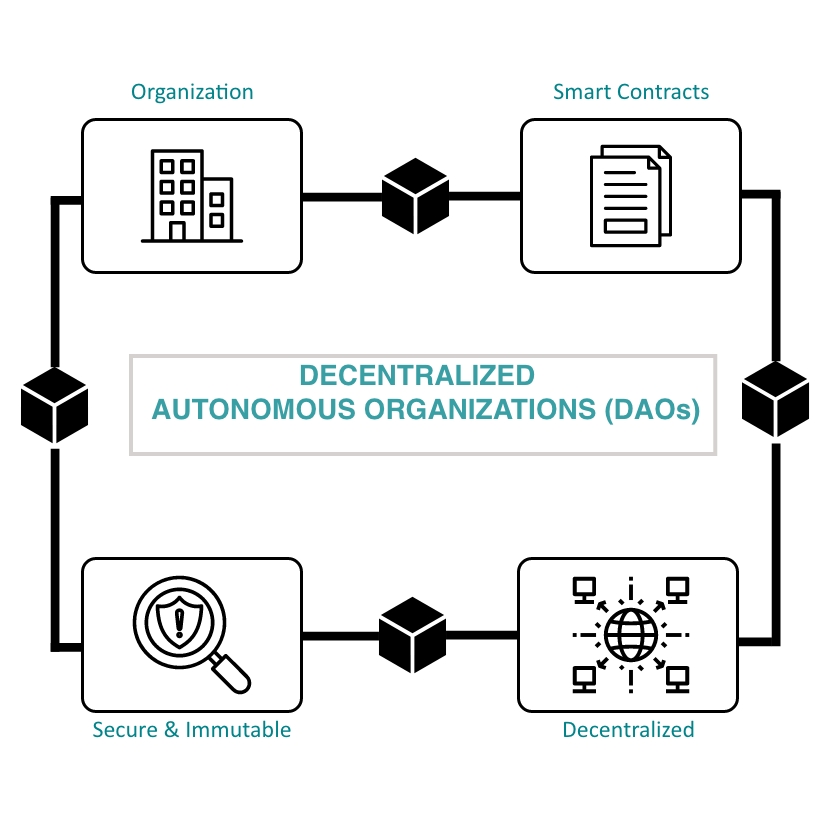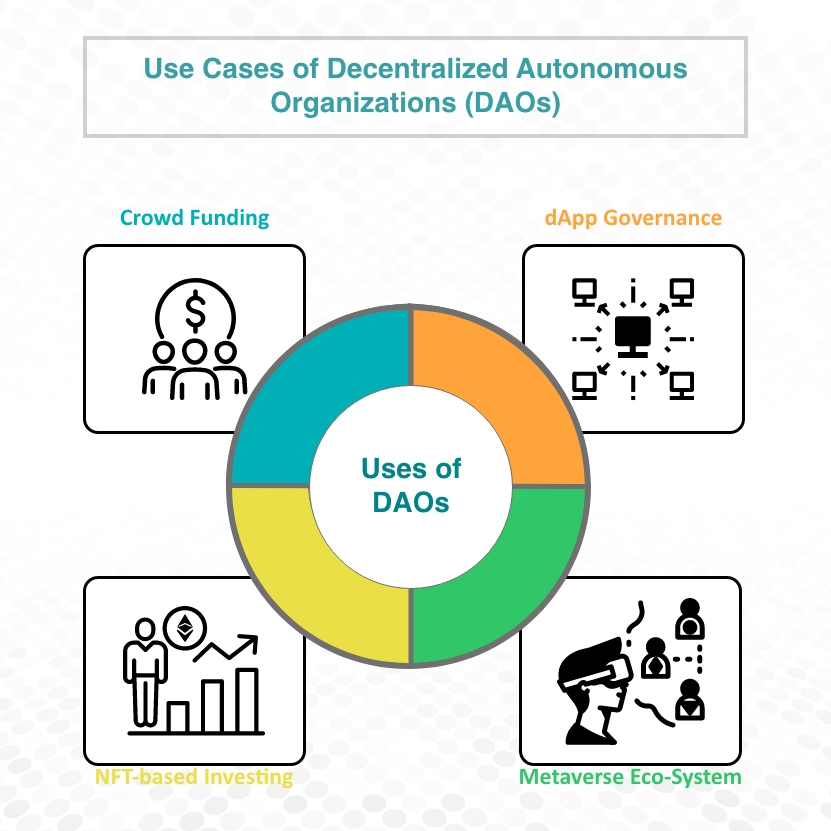
The world is steadily moving towards more advanced technologies, that don’t just only benefit humanity, but also revolutionize society. With the newest iteration of the internet, Web 3.0, which is based on blockchain technology, the world is adopting the decentralized format.
In this blog, we will understand Decentralized Autonomous Organizations, referred to as DAOs.
Topics covered in this blog:
- What are DAOs?
- Use-cases of DAOs
- Comparison between DAOs and traditional organizations
- How do DAOs work?
- Seaflux building a DAO organization!
- Endnote
What are Decentralized Autonomous Organizations (DAOs)?
DAOs are internet-based businesses that are genuinely based on the notion of “By the People, For the People”. Current organizations run on a hierarchical basis rather than a people-first basis. There’s always a lack of transparency, and the top-tier people always do the decision-making.
The main feature that differentiates DAOs from traditional organizations is that DAOs are democratic. There is no central authority, rather management is done by all the members. DAOs enable every member to have their say and get their voices heard. Rules are already pre-encoded into blockchain-based smart contracts, which makes them unalterable. Whenever there is a need to change any decision, it is done via voting and member proposals.
The Foundation of DAOs has to be the smart contracts, which enable the decentralized format of the system.
Use cases of Decentralized Autonomous Organizations (DAOs)
Traditional organizations are hierarchical in nature, there’s a lack of trust amongst their members. The main advantage of the use of DAOs is that you don’t need to doubt people! Everything is based on pre-encoded smart contracts and is fully automated.
The overall ideation behind having Decentralized Autonomous Organizations (DAOs), is to have a self-sustainable system, that is decentralized and offers people to collaborate in an effective and non-hierarchical manner.
Crowd Funding
One of the most prominent, and future-aligned use cases of DAOs is the crowdfunding aspect. Blockchain and DAOs are a great method, for bringing large amounts of people to raise money for a specific project.
dApp Governance
Decentralized applications have gained popularity quite well now, and with this, there is an utmost requirement to make the platform reliable. DAOs integrated with dApps will allow the users to propose app changes and provide voting rights to members, making it autonomous and transparent.
NFT-based investing
Amongst recent developments in the world of NFTs, one thing that has grabbed the attention of NFT enthusiasts is NFT-based investments via a DAO. For instance, PleasrDAO a DAO came forward as a buyer for a rare and expensive NFT.
Metaverse eco-system
Metaverse is ideally a real-time 3D virtual world. It allows the users to meet, play, and socialize in 3D fictional spaces. DAOs will allow the creation of a metaverse digital society, where decisions are collectively taken by every member, and benefit each one of them.
Let us now compare DAOs with traditionally existing organizations
Understand the below key advantages thatDAOs offer over traditionally existing organizations, that make them a favorable choice, and why experts suggest that it is the future!
Decentralized Autonomous Organizations (DAOs) | Traditional Organizations |
| Democratic in nature: Promotes equality amongst every member. | Based on a hierarchical tree.
|
| Decision-making is done on the basis of voting and member proposals. Each member has a say and can influence the decision. | Top-tier management has the right to change and influence the decision. |
| Automated using smart contracts | Human regulation |
| Promotes and sustains transparency throughout the organization. | Doesn’t have adequate transparency. |
How does a DAO work?
The foundation base of a DAO is smart contracts. They’re the heart and brain of the whole concept of decentralized organizations. Every rule and norm of the organization is pre-encoded in the smart contract. Once the contract gets deployed on the blockchain, there is no scope for alteration. Blockchain is immutable.
Because of this immutable nature, DAOs do not require any central governing authority, making them decentralized. Any changes in the organizational norms will be collectively decided by every member’s vote.
Seaflux building a DAO organization!
With Seaflux's knowledge and experience with creating smart contracts, they are working with an organization to deploy their first smart contract regulating HR norms. This is their first step towards the transition of being a DAO organization.
The Seaflux team is experienced and capable of revolutionizing an organization in a Decentralized Autonomous Organization (DAO).
End Note
With the development of Web 3.0, people are moving towards a decentralized world. Traditional organizations have a few shortcomings, that are solved with the help of blockchain technology.
Decentralized Autonomous Organizations (DAOs) are the future! They’re based around the idea of democracy, and allow each member to have their say. Everything is already written in smart contracts, making it immutable.
DAOs promote transparency throughout the organization, and there’s no need to doubt anyone.
We, at Seaflux, are Blockchain enthusiasts who are helping enterprises worldwide. Have a query or want to discuss Blockchain projects? Schedule a meeting with us here, we'll be happy to talk to you.

Jay Mehta
Director of Engineering








